Have you thought about installing solar panels on your RV but don’t know where to start? From RV solar systems to inverters, and deciding what kind of solar panels are best for an RV, there’s a lot to consider when purchasing solar panels for your rig.
Solar is a great way to power your RV when you’re looking to break away from electric hookups and enjoy the freedom that comes from living off the grid. When you have solar panels and a solar system set up in your RV or camper, you’ll be able to power all or some of your RV’s electrical needs like lights, appliances, and even your RV air conditioner.
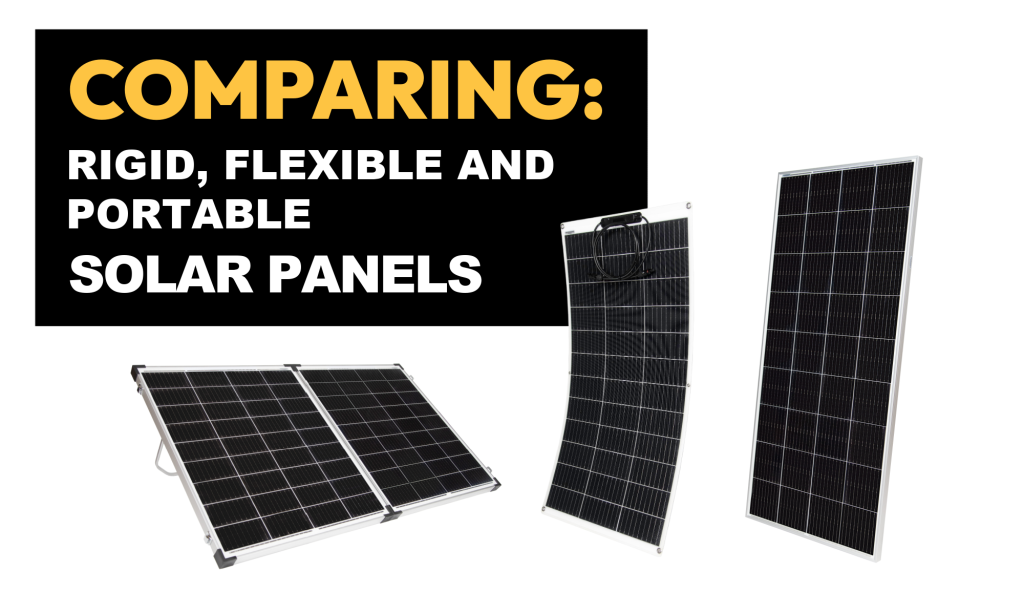
Monocrystalline and polycrystalline solar panels are the two most common types of solar cells. Both types of solar panels have the same purpose of converting sunlight into electricity. However, the crystalline structure of the cells affects their performance and appearance. Monocrystalline solar panels are more efficient than Polycrystalline panels, as they convert more sunlight into power. This makes them ideal for RVs with limited roof space. However, they come with a higher initial cost. On the other hand, Polycrystalline panels are a more budget-friendly option but offer lower efficiency. Hence, if your primary focus is efficiency, or you have limited roof space, you may prefer Monocrystalline panels instead of Polycrystalline ones.
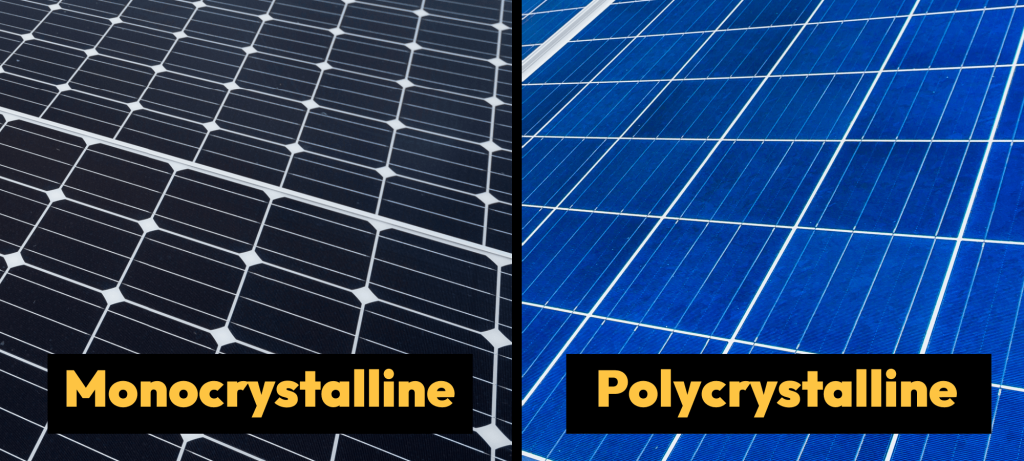
Flexible RV solar panels are lightweight and you guessed it, flexible. They easily bend or “flex” and are advertised that they can be mounted to almost any surface. Although they are lighter and marketed as more versatile, they have several downsides.
One of the main disadvantages of flexible RV solar panels is that they don’t last as long as their rigid counterparts due to durability and efficiency. While rigid RV solar panels can last up to 40 years or more, flexible RV solar panels may last up to 3-12 years, if they’re well taken care of. They don’t have a very high efficiency to begin with, so when their power output starts to drop, so does their performance.
Flexible RV solar panels are also prone to damage. Flexible solar panels can take being slightly bent and flexed, which is part of their appeal. But too much bending can actually cause the solar cells to crack. And, although they are advertised as being able to “mount” on a variety of surfaces, this can cause more damage to the panel as it keeps it from “breathing” and creates hot spots inside the solar panel. We’ve seen flexible panels that have been mounted to surfaces that have gotten so damaged that it actually catches on fire.
On the other hand, Rigid RV solar panels are the industry standard and are more durable and efficient. With strong frames and protective glass, they last for decades and have longer warranties. You can also adjust the angle of installation to maximize solar gain throughout the year. This can be beneficial during the winter months when the angle of the northern hemisphere tilts away from the sun.
Because Rigid RV solar panels are more durable, they’re heavier and take up more space. As a result, these solar panels are used best when permanently installed on top of roofs. Installing Rigid RV solar panels do require more effort and beefier mounting systems because they are heavier. Some people don’t like the idea of “putting holes in their roof” and instead opt for flexible RV solar panels over Rigid.
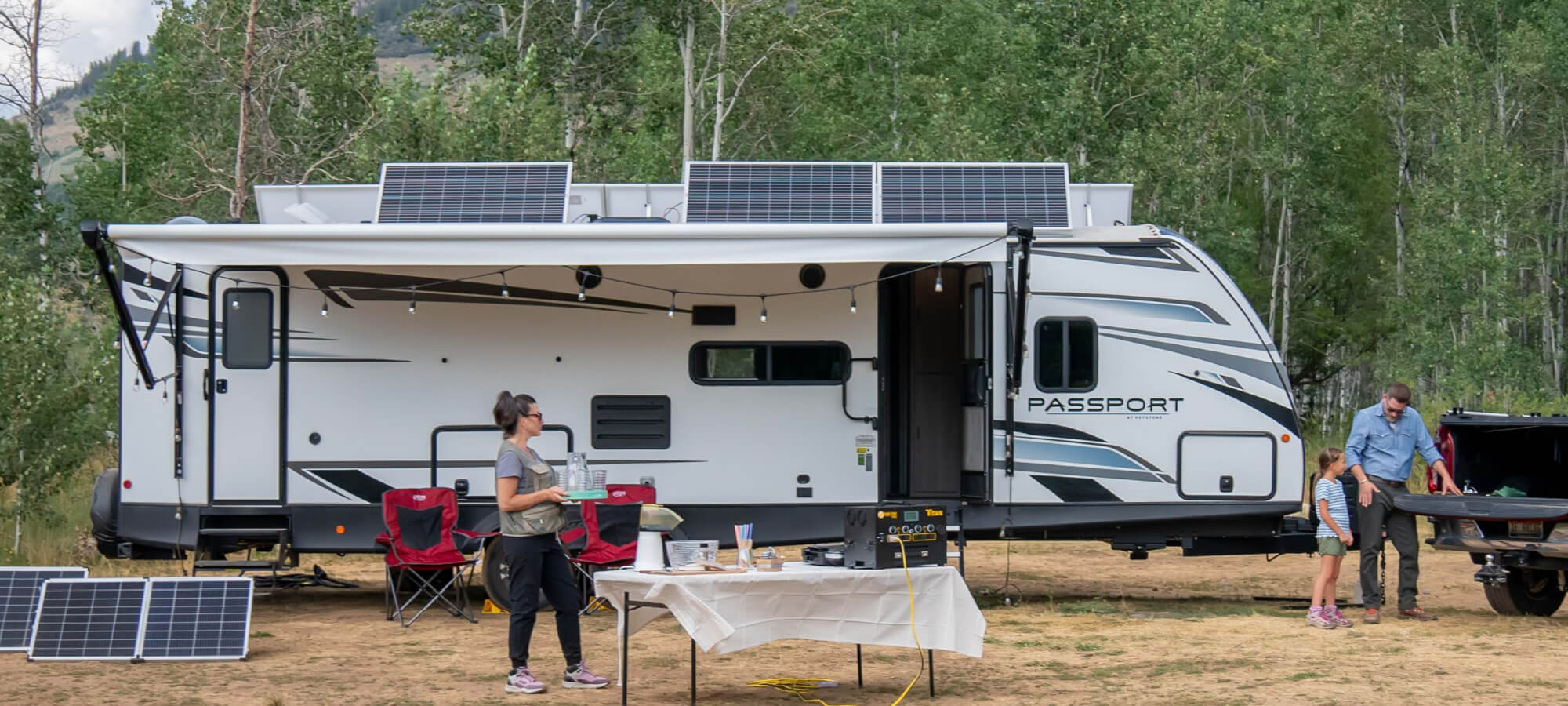
If you’re needing portability and not wanting to install Rigid RV solar panels, a great option may be Portable Rigid Briefcase solar panels. These foldable solar panels combine the portability of flexible solar panels with the durability and longevity of rigid solar panels. These portable rigid RV solar panels come with a convenient carry case to make it easier to transport. Although they are bigger and heavier than the flexible panels, they offer better durability and have the same exceptional warranty as the larger roof mounted Rigid RV solar panels.
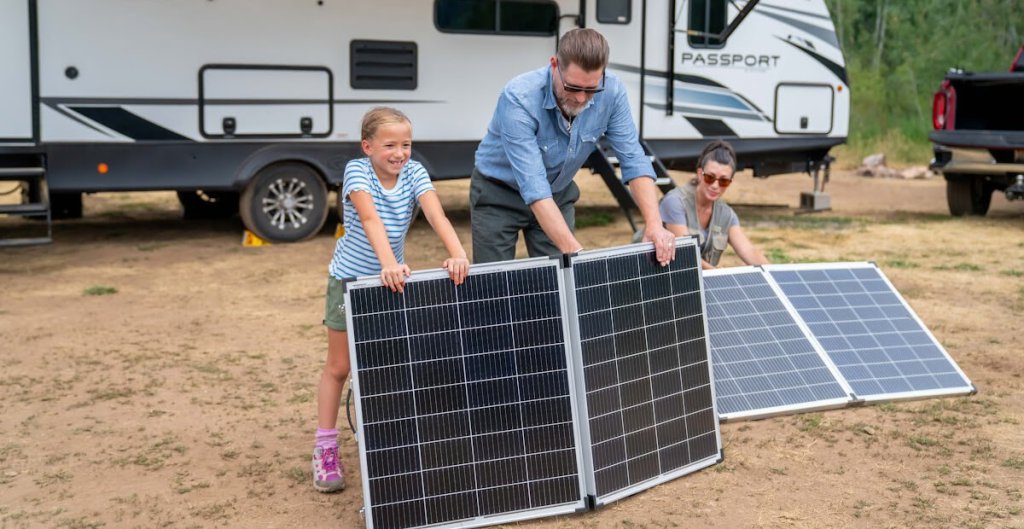
If you’re in a situation where you can’t justify the weight and size of Rigid RV solar panels, then opt for flexible ones but understand that you’ll have to put in some work to keep them maintained. It’s also important to be careful when you’re handling them. Even though they bend, flexible solar panels are still delicate. If you take care of your solar panels, then they will take care of you.

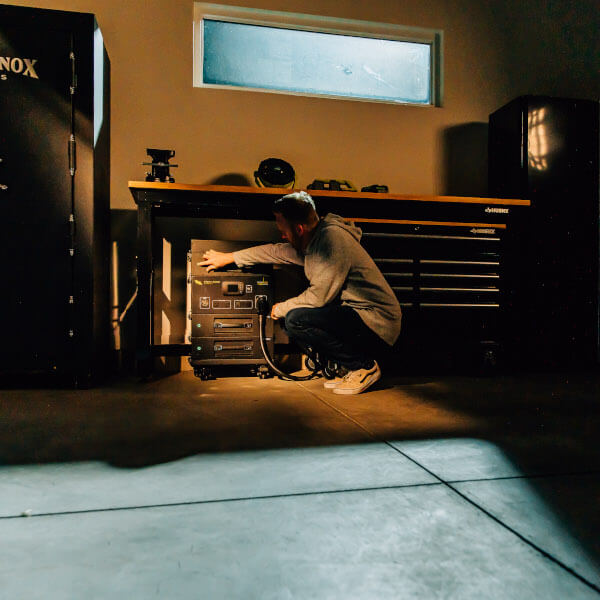
Teresa says:
Can flex rigid solar panels be used for full off grid camping for long periods of time
Point Zero Energy says:
I am not sure what you mean by flex rigid solar panels. There are flexible solar panels (should not be used for full off grid, or for very long periods), or there are rigid solar panels that can be used for full time off grid or long periods. There are briefcase panels that fold up, but use rigid panels, so they can be used full time.
Hazel B says:
Do you offer a larger watt rigid solar panel if your roof real estate is limited? Or is your system comparable with other brand solar psnels
Point Zero Energy says:
We do have 100 watt or 200 watt panels. Also our systems are compatible with any brand solar panels.
Bill Rounds says:
Do you have any worksheets to help determine what systems will work the best for our needs
Point Zero Energy says:
we do have a calculator here: https://www.pointzeroenergy.com/calc/size_calculator.html
Or if you need more personalized help, you can call us or email us: https://www.pointzeroenergy.com/contact-us/
Jonathan Labo says:
Can you supply a system that gives me 30 amp AC continuously?
Point Zero Energy says:
You mean you want 30A @120V continuously 24/7? If so, that is possible, but it would be very expensive. Depending on your location, you would need a minimum of 100kwh of batteries, and 25kw of solar panels. This is about 3-4 times the power a typical home uses, just to give some perspective.
Larry Jackson says:
I have a simi truck with a 144 inch sleeper it has a roof air conditioning and a roof fan is there a way to put solar panels on it I have room for maybe four panels or maybe six depending on length I have a headache for battery storage if so I would like your thoughts on this
Point Zero Energy says:
I am sure you could put panels on your roof. I would suggest contacting our support to get you more specific information: Support@pointzeroenergy.com or call 208.722.1342